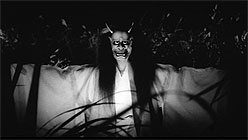The prolific Japanese screenwriter and director Kaneto Shindo, who died in May shortly after his 100th birthday, was an elemental filmmaker whose economy and discipline become more impressive with every passing year. (With every bloated blockbuster and incompetent indie, in fact.) An impeccable craftsman and an unwavering humanist, Shindo excised everything extraneous, from superfluous dialogue to secondary characters to subplots. That left ample room, in his sure hands, for mystery, ambiguity and terrifying profundity.
His best films, notably the three black-and-white gems in Kaneto Shindo Remembered chosen by Yerba Buena Center For the Arts film curator Joel Shepard, examine the tightrope between responsibility to one’s self (and one’s own needs, no matter how base) and one’s responsibility to others, be they relatives or the larger community. Shindo was marked forever, though not embittered, by the destruction of Hiroshima. His finest work displays a remarkable willingness to understand even the most callous behavior, an approach that engages the viewer’s empathy without speechifying or moralizing.

The Naked Island
The Naked Island (Aug. 9, 7:30pm and Aug. 12, 2pm), made for a pittance in 1960 when Shindo’s production company was on the verge of going belly-up, is a mesmerizing, nonverbal study of a stoic couple with two young sons living atop a hilly island. At first glance, their self-sufficient life in scenic solitude seems idyllic. Then we see, again and again, the extraordinary physical labor required to collect and carry fresh water, row it home, and lug it up a slender path — without spilling! — for crops, goats, chickens and themselves. The work is backbreaking and unrelenting, yet Shindo tempers it by granting us the pleasure of watching elegant, practiced movements.
You have to figure out the relationships between people in Shindo’s films, not only how individuals are related but how they relate to each other. Divining the balance of power and the division of labor (and emotion), in this case between the mother and father, is endlessly fascinating. The persistence on display — which mirrors the life-goes-on determination of the Japanese people after the war — is a vote of affirmation for the continuance of civilization. Who says art can’t be simultaneously sobering and inspiring?




